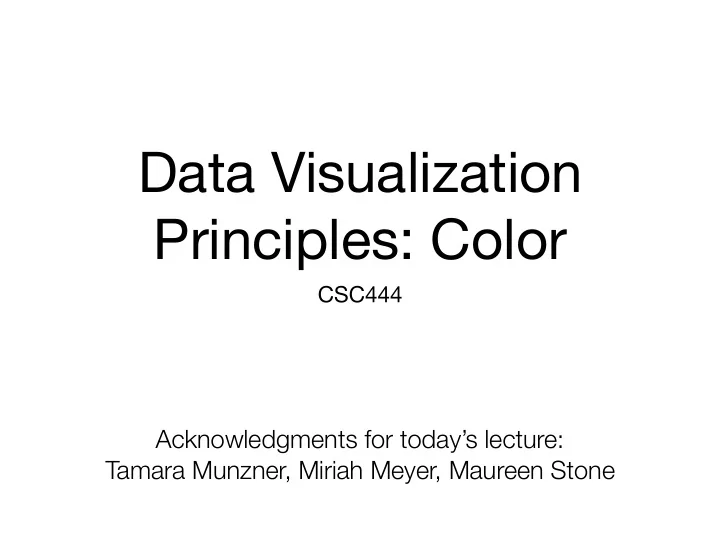

Data Visualization Principles: Color CSC444 Acknowledgments for today’s lecture: Tamara Munzner, Miriah Meyer, Maureen Stone
Outlook Mechanics Principles Techniques
WHY STUDY PRINCIPLES?
Ninio’s extinction illusion
https://cscheid.net/2014/12/13/not-spirals.html
Why worry about principles?
VISION IS COMPLICATED
Reading • “Representing Colors as Three Numbers”, Stone • Rainbow Colormap (Still) Considered Harmful, Borland and Russell. • Optional: • Face-based Luminance Matching… Kindlmann et al.
WHY COLOR?
Colin Ware, Information Visualization
LIGHT AND COLOR
How can it be that your perception of “yellow” from your laptop display “is equal” to the yellow from the sun , and that from a painting ?
How does light work? • Each photon has a “wavelength”, roughly the frequency in which it wiggles as it travels through space • Visible light is the same thing as FM radio is the same thing as X-rays is the same thing as microwaves
How does light work? https://www.flickr.com/photos/llnl/9403051123/
How does light work? http://www.chemistryland.com/CHM107Lab/Exp7/ Spectroscope/Spectroscope.html
How does light work?
How does your eye work? http://www.retinalmicroscopy.com/mosaics.html
How does your eye work? Cones Rods http://www.retinalmicroscopy.com/mosaics.html
How does your eye work?
TRICHROMACY Three numbers!
same three numbers, same impression METAMERISM
OPPONENT PROCESS MODEL
COLOR VISION DEFICIENCIES
Ishihara Plates http://www.dfisica.ubi.pt/~hgil/ p.v.2/Ishihara/Ishihara. 24.Plate.TEST.Book.pdf
What goes wrong? • Two broad classes of problems: • Only some types of cones present in the eye (rare) • red-green dichromacy, blue-yellow dichromacy • Two types of cones with abnormally close response curves • relatively common for red-green
How do the “color blind glasses” work?
What goes wrong?
WHAT ARE THE PRIMARY COLORS?
WHAT ARE THE PRIMARY COLORS? 1. red, green, blue 2. red, yellow, blue 3. orange, green, violet 4. cyan, magenta, yellow
WHAT ARE THE PRIMARY COLORS? 1. red, green, blue 2. red, yellow, blue 3. orange, green, violet 4. cyan, magenta, yellow 5. all of the above
Any three “independent” ways of combining color works (!)
Any three “independent” ways of combining color works (!) … and it works against any background color !
General principle: your visual perception of an object often depends on the surrounding objects
http://swiked.tumblr.com/post/112073818575/guys-please- help-me-is-this-dress-white-and
https://xkcd.com/1492/
same three numbers, same impression METAMERISM
CONSTANCY AND ADAPTATION
SPATIAL ADAPTATION
SPATIAL ADAPTATION
SPATIAL ADAPTATION
SPATIAL ADAPTATION
SIMULTANEOUS CONTRAST http://www.handprint.com/HP/WCL/tech13.html
TEMPORAL ADAPTATION http://www.moillusions.com/black-and-white-in-colour- again.html/13191556xteeocm7
Impossible Colors (!) http://upload.wikimedia.org/wikipedia/commons/5/56/ Chimerical-color-demo.svg
Extras (stu ff we skipped in class)
Dividing by “luminance” http://sysmagazine.com/posts/181580/
COLOR GAMUTS
Recommend
More recommend